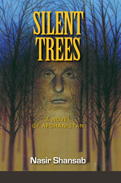"Tell him, we know he maintains a steady association with a man from the American embassy. The man's wife visits Dhil in his house. I'm willing to look the other way in regards to what he does with the American woman. But he must end his affair with Miriam Khan at once. We observe every move he makes. Tell him that. Tell him, he can't hide from us."

 |
Silent Trees by Nasir Shansab Bartleby Press
book review by Wendy Strain
Providing a glimpse into Afghanistan just prior to Russian or American occupation, Shansab gives his readers an idea of the overwhelming complexity and corruption that can occur when unlimited power falls into the hands of a very few men.
The story is ostensibly centered on a single character, Habib Dhil, but also explores the relationships and life events of other characters that Dhil comes into contact with in one way or another. Such interactions and seemingly unrelated side-tracks come together as the story unfolds in sometimes surprising ways. Friendships become tested and strength of character is continually tested as the power play moves forward.
This was not an easy book to get started, but once past the initial introductions to some of the main players, it becomes difficult to put down. Well-written with naturally flowing dialog and enough action to keep the pages turning, Shansab depicts flawed characters doing their best to survive a harsh climate both physically and politically. Beautiful passages describing the Afghanistan landscape are easy to envision and give a strong sense of place even to those who have never traveled in this part of the world.
Another element of the book that strongly appeals is the ability to see into a society and a time period that few Americans understand. Multiple levels of Afghani society are shown from the poorest peasants to the very wealthy upper classes of business and government, as well as their interactions among each other. No apologies or excuses offered for cultural and historical realities. At the same time, love of country and nostalgia for a simpler past shine clearly from the pages.
RECOMMENDED by the US Review